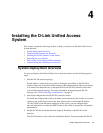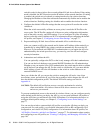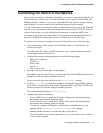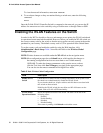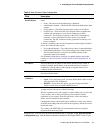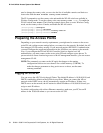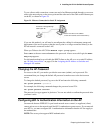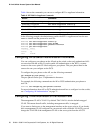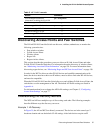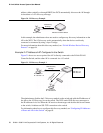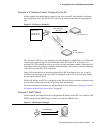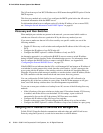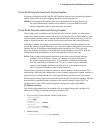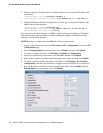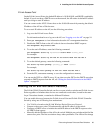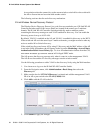
Discovering Access Points and Peer Switches 57
4 Installing the D-Link Unified Access System
Table 5. AP VLAN Commands
Discovering Access Points and Peer Switches
The D-Link WLAN Controller Switch can discover, validate, authenticate, or monitor the
following system devices:
• Peer wireless switches
• D-Link Access Points
• Wireless clients
• Rogue APs
• Rogue wireless clients.
This section describes the procedures you use to discover D-Link Access Points and other
D-Link WLAN Controller Switches. For information about the discovery of wireless clients,
see “Monitoring Associated Client Information” on page 138. For more information about
discovering rogue devices, see “Monitoring Rogue and RF Scan Access Points” on page 136.
In order for the WCS to discover other WLAN devices and establish communication with
them, the devices must have their own IP address, must be able to find other WLAN devices,
and must be compatible.
When the D-Link WLAN Controller Switch discovers and validates D-Link Access Points, the
switch takes over the management of the AP. The default AP Profile settings are listed in
Appendix A.
For information about how to change the AP Profile settings, see Chapter 5, “Configuring
Access Point Settings” on page 77.
Understanding the Discovery Methods
The WCS and AP have multiple ways of discovering each other. The following examples
describe different ways the discovery can occur.
Example 1: L2 Discovery
In Figure 30, the AP and WCS are directly connected. The devices are in the same layer 2
broadcast domain and use the default VLAN settings. After both devices acquire an IP
Action Command
View management interface
information, including the VLAN ID
get management
Set the management VLAN ID
set management vlan-id <1-4096>
View untagged VLAN information
get untagged-vlan
Enable the untagged VLAN
set untagged-vlan status up
Disable the untagged VLAN
set untagged-vlan status down
Set the untagged VLAN ID
set untagged-vlan vlan-id <1-4096>



